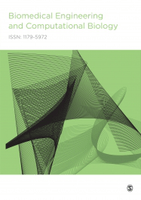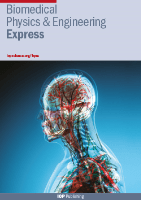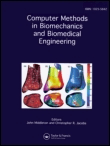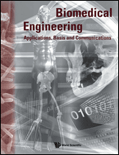
Biomedical Engineering and Computational Biology
Scope & Guideline
Unlocking Potential in Healthcare Through Computational Insights
Introduction
Aims and Scopes
- Biomedical Modeling and Simulation:
The journal emphasizes the development and application of computational models and simulations to understand biological processes, such as disease progression and treatment outcomes. - Machine Learning and Artificial Intelligence in Healthcare:
A significant focus is placed on utilizing machine learning algorithms and artificial intelligence for diagnostic purposes, treatment planning, and predictive analytics in various medical fields. - Innovative Biomedical Devices and Technologies:
Research on the design, development, and implementation of novel biomedical devices and technologies that improve patient care and treatment efficacy is a core area of interest. - Digital Health and Telemedicine:
The journal explores advancements in digital health technologies, including telemedicine, wearable devices, and health information systems, aimed at enhancing patient engagement and healthcare delivery. - Nanotechnology and Biomaterials:
There is a strong interest in the application of nanotechnology and the development of new biomaterials for medical applications, including drug delivery systems and tissue engineering.
Trending and Emerging
- Deep Learning Applications in Medical Diagnostics:
There is a notable increase in research utilizing deep learning techniques for medical diagnostics, including automated detection of diseases such as cancer and the analysis of complex biological data. - Digital Health Innovations:
Emerging themes in digital health, particularly the integration of digital twins and telehealth solutions, are becoming prominent as researchers explore their applications in improving patient outcomes. - Microfluidics and Lab-on-a-Chip Technologies:
Recent publications indicate a growing interest in next-generation microfluidics for biomedical applications, reflecting the trend towards miniaturization and automation in laboratory processes. - Nanomaterials for Biosensing and Therapeutics:
Research on the use of nanomaterials for biosensing and therapeutic applications is on the rise, showcasing the potential of these materials in enhancing diagnostic accuracy and treatment effectiveness.
Declining or Waning
- Traditional Statistical Methods in Biomedical Research:
There appears to be a decline in the use of traditional statistical methods for data analysis in favor of more advanced computational techniques, such as machine learning and deep learning. - Basic Biomedical Research without Computational Integration:
Research that does not integrate computational approaches or advanced modeling techniques is becoming less common, as the journal increasingly prioritizes interdisciplinary studies. - Single-Discipline Focus:
Papers that focus solely on one discipline, such as pure biology or traditional engineering without a computational aspect, are less frequently published, reflecting a shift towards more integrated research.
Similar Journals

TECHNOLOGY AND HEALTH CARE
Advancing Health Through Technological IntegrationTECHNOLOGY AND HEALTH CARE, published by IOS PRESS, stands as a prominent interdisciplinary journal dedicated to the integration of technology within the healthcare sector. With an ISSN of 0928-7329 and an E-ISSN of 1878-7401, this journal has been a vital resource since its inception in 1993, providing insights and advancements in various categories including bioengineering, biomedical engineering, health informatics, and more. Though it currently holds a Q4 classification in several fields and Q3 in others, it actively contributes to the dialogue surrounding innovative methodologies and practices that enhance healthcare delivery. Researchers, professionals, and students will find the journal invaluable for its diverse range of studies that explore the convergence of technology and health. Its commitment to fostering impactful research continues to reinforce its relevance in the evolving landscape of healthcare technology.

Journal of Biomimetics Biomaterials and Biomedical Engineering
Empowering Researchers to Revolutionize Biomedical ApplicationsThe Journal of Biomimetics Biomaterials and Biomedical Engineering, published by TRANS TECH PUBLICATIONS LTD, stands at the forefront of interdisciplinary research that merges biology with engineering to address real-world challenges in healthcare and material science. Since its inception in 2014, the journal has contributed valuable insights into the development of innovative biomaterials and biomedical applications, showcasing research excellence in its fields, including biotechnology and bioengineering. With an ISSN of 2296-9837 and an E-ISSN of 2296-9845, this journal provides a platform for both emerging and established researchers to disseminate their work, fostering knowledge transfer across the global scientific community. Currently positioned in the Q4 quartile across categories such as Bioengineering, Biomedical Engineering, and Biotechnology, it aims to enhance its impact through open-access policies and rigorous peer-review processes. With its headquarters in Germany, the journal welcomes diverse contributions from around the world, shaping the future of biomimetic technologies and advancing our understanding of complex biomedical systems.

Network Modeling and Analysis in Health Informatics and Bioinformatics
Elevating health informatics through advanced data analysis.Network Modeling and Analysis in Health Informatics and Bioinformatics, published by SPRINGER WIEN, stands as a vital resource in the interdisciplinary domains of health informatics and bioinformatics. With an ISSN of 2192-6662 and E-ISSN of 2192-6670, this journal aims to facilitate the dissemination of innovative research that intersects network modeling, data analysis, and health applications. The journal competes at a Q3 quartile level across multiple categories including Biomedical Engineering and Health Informatics, showcasing its growing influence within the academic community. As of 2023, it holds impressive Scopus rankings, including a 20th position in Urology, illustrating its significance in the field. Although not an open access publication, the journal is dedicated to providing cutting-edge insights from 2012 to 2024 and is poised to attract researchers, professionals, and students striving to push the boundaries of knowledge in health informatics and bioinformatics. This journal is not just a platform for sharing scholarly articles; it is a catalyst for advancing methodologies that enhance patient care and medical research.

Biomedical Physics & Engineering Express
Connecting Biomedical Physics with Engineering ExcellenceBiomedical Physics & Engineering Express, published by IOP Publishing Ltd, serves as a dynamic platform for the dissemination of groundbreaking research in the interdisciplinary domains of biomedical physics, engineering, and related fields. With a focus on innovative solutions for healthcare challenges, the journal extends its reach to a global audience, providing valuable insights that influence both academic research and practical applications. Operating under an open-access format, this journal ensures that vital scientific discoveries are readily available to researchers, professionals, and students alike. Ranking within the Q3 and Q4 quartiles across various categories—including Bioengineering and Biomedical Engineering—indicates its emerging influence in the scientific community since its inception in 2015. With an increasing footprint in Scopus rankings and a commitment to advancing knowledge in subfields such as biophysics and health informatics, Biomedical Physics & Engineering Express plays a crucial role in shaping future innovations in healthcare technology and patient care.

COMPUTER METHODS IN BIOMECHANICS AND BIOMEDICAL ENGINEERING
Innovating Computational Techniques for Medical BreakthroughsCOMPUTER METHODS IN BIOMECHANICS AND BIOMEDICAL ENGINEERING, published by TAYLOR & FRANCIS LTD, is a leading journal dedicated to the interdisciplinary field of biomechanics and biomedical engineering. With an ISSN of 1025-5842 and an E-ISSN of 1476-8259, this journal has been a significant resource since its inception in 1997 and will continue to publish cutting-edge research until 2024. The journal holds a respectable position in the academic community, categorized in Q3 of multiple domains including Bioengineering, Biomedical Engineering, and Human-Computer Interaction, reflecting its relevance across diverse fields. Although the journal does not offer open access, it provides valuable insights and methodologies essential for researchers, professionals, and students engaged in advancing computational techniques and their application in medicine and engineering. With Scopus rankings highlighting its growing influence, particularly in the Biomedical Engineering and Human-Computer Interaction sectors, this journal plays a crucial role in fostering innovation and enhancing the understanding of biomechanical systems through computational methods.

Intelligent Medicine
Bridging technology and medicine for a healthier tomorrow.Intelligent Medicine, published by Elsevier, is a leading open-access journal dedicated to advancing the fields of Artificial Intelligence, Biomedical Engineering, Health Informatics, and related areas within Medicine. Since its inception in 2021, it has quickly established itself among the top tier of academic publications, holding a commendable Q2 ranking in several categories, including a rank of #51 in Health Informatics and #104 in Medicine (Miscellaneous) as of 2023. The journal aims to disseminate innovative research that harnesses AI technologies to improve healthcare outcomes, bridging the gap between cutting-edge technology and medical practice. With its open-access model, Intelligent Medicine ensures broad dissemination of research findings, facilitating collaboration and knowledge sharing among researchers, practitioners, and students globally. Located in Amsterdam, Netherlands, this journal plays a pivotal role in shaping the future of intelligent healthcare solutions, inviting submissions that push the boundaries of conventional medicine through creative and impactful research.

BME Frontiers
Empowering Research to Transform HealthcareBME Frontiers, published by the American Association for the Advancement of Science, is an innovative open-access journal dedicated to the burgeoning field of Biomedical Engineering. Since its establishment in 2020, this journal has aimed to bridge the gap between cutting-edge research and practical application, promoting advancements in biomedical technologies, medical devices, and healthcare solutions. Boasting impressive rankings within Scopus—64th among 398 in Medicine (miscellaneous) and 81st among 303 in Biomedical Engineering—BME Frontiers stands out as a significant contributor to scholarly communication, offering rich insights for researchers, professionals, and students alike. With consistent publication projected through 2024, the journal serves as an essential platform for disseminating high-quality research that can drive innovation and inspire new approaches in the healthcare sector.

Advanced Biomedical Engineering
Empowering knowledge sharing in engineering and biology.Advanced Biomedical Engineering is a peer-reviewed open access journal published by the Japanese Society for Medical & Biological Engineering, dedicated to disseminating high-quality research in the multidisciplinary fields of biomedical engineering. Boasting an ISSN of 2187-5219, this journal has been pivotal since its inception in 2018, especially as it embraces the open access model to foster knowledge sharing and wide accessibility. Centered in Tokyo, Japan, it serves as a vital platform for scholars and practitioners across various domains, such as biomaterials, biomedical engineering, and biotechnology. Despite currently residing in the Q4 quartile across several categories, including those in biotechnology and computer science applications, the journal is committed to elevating its academic impact and reputation, aiming for improved rankings in Scopus and other databases. Researchers and professionals are encouraged to contribute their innovative findings, discussions, and case studies, facilitating the advancement of this dynamic field.

Biomedical Engineering Letters
Connecting scholars to elevate biomedical engineering.Biomedical Engineering Letters, published by SpringerNature, is a prominent journal in the field of Biomedical Engineering. With a robust ISSN of 2093-9868 and E-ISSN of 2093-985X, this esteemed journal has established itself as a vital resource for researchers and professionals seeking to advance their knowledge and share groundbreaking findings. Recognized for its quality, Biomedical Engineering Letters holds a distinguished ranking in Scopus, positioned at #94/303 (69th percentile) in the Biomedical Engineering category. The journal covers a diverse scope within biomedical engineering, providing an important platform for innovative research from 2011 to 2024 and facilitating the exchange of ideas among scholars. Although it operates under a subscription model, the journal's commitment to enhancing the field makes it an indispensable reference for those engaged in cutting-edge biomedical research in Germany and globally.

BIOMEDICAL ENGINEERING-APPLICATIONS BASIS COMMUNICATIONS
Exploring the future of biomedical applications.BIOMEDICAL ENGINEERING-APPLICATIONS BASIS COMMUNICATIONS is a prominent journal dedicated to the dynamic field of biomedical engineering, published by WORLD SCIENTIFIC PUBL CO PTE LTD. Since its inception in 1992, the journal has provided a platform for the dissemination of high-quality research and innovative applications within the biomedical engineering domain. Despite its current Q4 ranking in multiple categories such as Bioengineering and Biomedical Engineering, the journal serves as an essential resource for researchers and professionals seeking to explore the latest developments and practical applications in this interdisciplinary field. The journal is based in Singapore, reflecting the region's growing influence in scientific research and technology. Although it does not offer open access, it continues to attract submissions that enrich the scientific dialogue within its community. With a commitment to fostering knowledge and research collaboration, this journal remains a vital contributor to the ongoing advancements in biomedical technology and engineering.